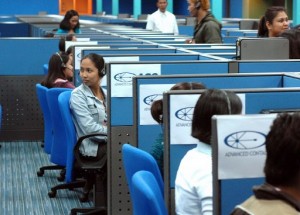Booming PH outsourcing industry faces worker shortage
MANILA, Philippines — The Philippines’ outsourcing industry faces a shortage of trained personnel after a decade of rapid growth which saw it become a pillar of the economy, the industry association said Tuesday.
The country’s outsourcing industry, second only to India, is suffering from “growing pains” as booming demand overtakes the supply of trained workers, said Jose Mari Mercado, president of the IT-Business Process Association of the Philippines.
The industry, which includes call centers, software design, animation and other functions that foreign companies find cheaper to farm out abroad, has grown by about 20 percent annually since 2007, he said.
“We’ve been so successful that our clients are asking us to do more work but the work they are asking us to do requires certain skills we don’t normally have,” he told AFP on the sidelines of an industry summit.
There is a growing demand for financing and accounting personnel, and even for experienced middle managers that the industry cannot immediately meet, he added.
Mercado projects the industry will have 960,000 direct employees and earn $16 billion overseas this year, up from 777,000 direct employees and $13 billion in 2012.
The industry now accounts for eight percent of the economy and this could rise to about 10 percent by 2016 with 1.3 million direct employees and $25 billion in overseas earnings, he said.
The Philippines is the world’s top location for call centers but is finding it difficult to fill more technical jobs.
“What is stopping us from growing faster is that our skills and competences have to develop faster to meet the global demand,” Mercado said.
“You can’t just say you will hire a middle manager with five years of experience. There are very few people (like that). Definitely it is part of growing pains,” he added.
The industry group is working with government and academic circles to develop courses to produce graduates who can meet the demand, he said.
Government and industry are also moving to expand the talent pool by setting up more outsourcing centres outside Metropolitan Manila, which now hosts 72 percent of all such companies, he said.
